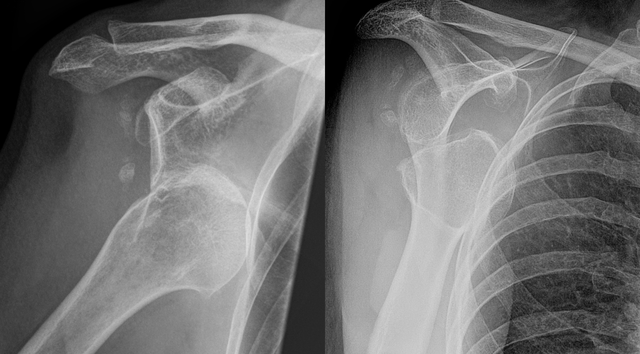Dislocated Shoulder
A dislocated shoulder is a surprisingly common injury, particularly for those involved in sports or other active lifestyles. The shoulder is one of the easiest joints to dislocate, although it can be very painful. And, despite the depiction in popular movies and television shows, putting a dislocated shoulder back in place requires much more than simply slamming it into a wall.
In this post, we will look at a wide range of topics surrounding dislocated shoulder injuries, including
- What is a dislocated shoulder?
- What causes a dislocated shoulder?
- What are the symptoms of a dislocated shoulder?
- What should you do if you think your shoulder is dislocated?
- What treatments are available for a dislocated shoulder?
- When is surgery necessary for a dislocated shoulder?
- How can Michigan Surgery Specialists help?
What Is a Dislocated Shoulder?
The shoulder is the most mobile joint in the body. This is one reason that it is more susceptible to dislocation than other joints.

It is also one of the most frequently used joints and is routinely put under a great deal of stress and pressure. In a dislocated shoulder, the head of the upper arm bone is out of the cup-shaped socket on the shoulder. A dislocation can be either partial or complete, but both have similar symptoms.
What Causes a Dislocated Shoulder?
Because the shoulder joint can move in many directions, it is less secure than other joints and more prone to dislocation.
The most common reason for dislocation is a traumatic injury – being hit in full-contact sports, for instance. In fact, sports-related injuries are among the most common causes of this injury. Other common causes of should dislocation include:
- Traumatic injury/impact during an auto accident
- Falling from a height and landing on your shoulder
- Tripping and falling, then landing on your shoulder
What Are the Symptoms of a Dislocated Shoulder?
As mentioned, both partial and complete dislocations share similar symptoms. However, the symptoms may be more severe with complete dislocations. Some of the most common symptoms include:
- An inability to move the shoulder joint/arm
- Visible shoulder deformity
- Bruising
- Numbness in the arm and/or shoulder
- Muscle spasms in conjunction with other symptoms
- Weakness in the arm
- Swelling
- Intense pain at the joint
- Pain that travels from the shoulder down the arm or up the neck
What Should You Do If You Think Your Shoulder Is Dislocated?
If you think that your shoulder is dislocated, it is important to seek medical attention immediately. Do not attempt to put your shoulder back in the joint on your own.
Chances are good that swelling will make this impossible, and you could cause additional damage. Instead, follow these steps:
- Seek medical attention.
- Do not move your shoulder or arm.
- If necessary, splint your arm to keep it immobile.
- Use ice to control swelling and pain.
What Treatment Options Are Available for a Dislocated Shoulder?
The specific treatment chosen by your doctor will depend on the severity of the dislocation and any other injuries.
- Closed reduction: In this procedure, the shoulder is placed back into the joint. A mild sedative is usually used, and an X-ray is taken afterward to make sure the shoulder is properly seated.
- Immobilization may also be used after the shoulder is put back in place. This is done to help keep the shoulder still while it heals.
- Medication will usually be prescribed – over-the-counter pain relievers like ibuprofen are usually sufficient, but tramadol may also be used in some cases.
- In a worst-case scenario, surgery may be necessary to repair a dislocated shoulder.
When Is Surgery Necessary for a Dislocated Shoulder?
If the dislocated shoulder also causes a vascular injury, such as damage to a vein or artery, immediate surgery is necessary.
Surgery may also be the best option if a closed reduction failed, or there is a lot of damage to the muscle tissue, ligaments, or blood vessels around the shoulder joint.
You may need open shoulder surgery if weakness or pain persists after a closed reduction and/or arthroscopic surgery.
In this procedure, the surgeon will make a single large incision on the shoulder in order to better access ligaments, tendons and muscle tissue in need of repair.
A bone graft may be necessary to repair bone loss in the case of repeated shoulder dislocations.
How Can Michigan Surgery Specialists Help?
Our team of experts has helped many people suffering from shoulder dislocation. The surgeons at Michigan Surgery Specialist will help you get back to the activities that you love.
Request an appointment with Michigan Surgery Specialists today!
Meet our physicians



